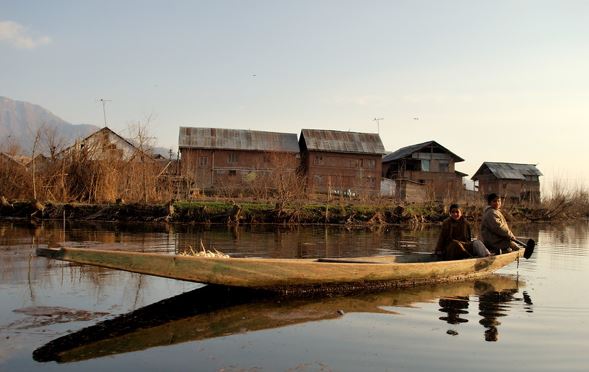Return to Native Names
By Javaid Iqbal Bhat 
When the British arrived in the Indian Sub-continent as colonisers they changed the names of places according to their own convenience. Anyone having a basic common knowledge of colonialism will be aware about this. So Vadodara became Baroda, Thiruvanthapuram was converted into Trivandrum, Kochy became Cochin, and a host of other names witnessed interesting transformations. The main reason behind the corruption of the original names was the discomfort the colonial tongue was subjected to by the “peculiar” native names. When the colonisers could not articulate the names as they were articulated by the natives they found it easier to write and speak about them as they felt appropriate. The other factor was psychological as the rulers asserted their supremacy and used the name-changes to symbolically put the colonised under their imperial writ. This practice was extended to other things, including the colonised- the latter remained helpless spectators as they found their names sounding different on the master’s tongue. It was a privilege to hear one’s names articulated by the master, and the idea of correction was far-fetched. The subservience was such that the native had no option other than mimicking the master and giving currency to this corruption by the coloniser. This practice continued for a long time until the native got some degree of freedom and he began to contemplate a return to the earlier nomenclatures.
Ever since independence, around 100 Indian cities and towns have changed their names, returning to the earlier names; and over 1,000 roads have been given a new identity. It is not that the imperial names were difficult to express for the natives, in fact most of them had become so popular and penetrated into the mass consciousness that many people refused to return to the earlier versions and demanded retention of those names. When Madras was changed to Chennai, a noted writer stated that the weather will remain same with either name given to the city, and it will hardly make any difference except that giving a new name will reflect a sense of insecurity among the Indians. The return of old names did not make any material difference to the lives of the people, nor did it change the economic condition of the masses. The poor continued to remain poor and the ruling elite continued to exploit the subjects as they used to do during the imperial period. However, the change in names gave a sense of pride and cultural assertion and empowerment to both the ruled and the rulers, the laymen and the elite; a sense that a vital link with the roots of culture had been restored. The new names did not wipe away the misdeeds of imperialism, nor did they make any difference to the country from where the imperial masters came but reaffirmed the idea that the colonial period and all that was done during that era was under the condition of force and without the consent of the natives.
The contentious discussion about the name of Pretoria in South Africa exemplifies the tension of the new demands for cultural affinity and nostalgia for the imperial nomenclature. The urge to remove the name Pretoria in favour of an older pre-apartheid name is redolent of need for assertion of cultural identity. The recent debate about the name of the Aurangzeb Road in New Delhi has similar underpinnings.
“The Usage of names imposed by a ‘superior’ power produces what VS Naipaul calls mimic men-who go on to corrupt their native names without feeling any sense of guilt or shame”
What happens when names are officialised and standardised not according to the will of the people but as per the sweet wishes of the rulers? To begin with, the masses who have their own names for places and things are rendered without agency. They lose self-esteem and are forced to accept through routine and practice what was unheard of before. The acceptance comes through repetitive use – officialisation and the systems of reward and punishment which accompanies it and the paraphernalia associated with it. Second, the imposed names make the users harbour grudges, which with the passage of time simmer, gather weight and wish to find an outlet through means which may not be palatable to the imposers. Third, the imposed names disturb a sense of continuity and belonging with the native moorings, creating a sense of artificial connection with the ideas and institutions which arrive with the imperial power structure. Fourthly, the usage of a name imposed by a “superior” power and culture produces what V.S. Naipaul calls mimic men – who go on to corrupt their native names after the corruption of the colonisers without feeling any sense of guilt or shame. In other words, the name-corruption at the top is multiplied in various forms and at various places by the natives themselves. So if the British made Madras out of Chennai, the natives anglicise the street next door because they have understood now what will be easier for the British tongue, and without the request of the latter make little linguistic changes, knowing well which sounds will flow smoothly out of the foreign mouth.
On the face of it, any suggestion of a change from Kashmir to Kaesheer sounds immature, and one which seems to bump on our inherited and established sensibility of names. We are so used to switching from Kaesheer to Kashmir that any argument for standardizing and normalizing Kaesheer is not taken seriously. Rather, people uninitiated into the significance of retaining the sounds and names as articulated by the people who lived in those places for centuries, simply refuse to entertain even the idea of firmly rooting the native name across all linguistic registers. What you get in return to the recommendation of change is a dismissive smile. Therefore, while conversing with each other, the native name of Kaesheer is taken for granted and used effortlessly. However, the same undergoes a transformation when the border is crossed from the linguistic register of Kashmiri to Urdu or English. How many Kashmiris, while talking to each other, use the word Kashmir and abandon the word Kaesheer? Practically speaking, none. It is always ‘Kaesheertarav’, ‘Kaesheergachav’ ‘Kaesheer chi halaat kharaaab’ and so on and so forth. You hardly hear ‘Kashmir tarav’ or any other Kashmiri word preceded by ‘Kashmir.’ The question that comes to mind is why do we use the word Kashmir and not Kaesheer when we speak or write in a language other than Kashmiri?
“The self-inflicted distortions, the internal corruptions and false sense of superiority have to be swept away to uncover our unpretentious self, irrespective of the linguistic discomfort it might cause to others”
Names do not occupy a vacuum. There is an entire system of values and attitudes associated with them. Similarly, Kaesheer as a distinct marker, moving on our tongues for centuries, is intertwined with memories and interlinked with myriad cultural patterns and innumerable forms of thought. By corrupting the original and superimposing another name, we are disrupting those subtle and nuanced cultural patterns. By the way, the point to note is that this corruption is not principally due to any colonial agency, but there is a clear implicit local sanction for the corruption. No doubt the British, through their colonial administrators, and a number of orient lists who wrote and thought about Kashmir, felt it convenient to use Kashmir, but even after their departure, the natives have absorbed their linguistic sleaze and made it their own. Otherwise, what law or convention has prevented the natives from at least contemplating a return to the native verbalization of the nomenclatures? On the ground though there is not even a murmur about the need for change. One of the main reasons for the unavailability of the native names is the unconcerned stance towards both the native as well as whatever is connected with him. The native language has not received the recognition and importance which was due to it for its antique intellectual pedigree. With the denial of that recognition and importance, all that is part of the native language also stands practically dismissed as unimportant and one which befits the low and the orderly among the natives. Forget about the normalization of names, even the language itself has been rendered insignificant to the extent that the space for it is shrinking. How can we normalize the use of Kaesheer, when everything associated with the word Kaesheer, its universe of other inter related signs and symbols, is gradually de-normalized?
The other reason is the lack of cultural confidence in being just ourselves whether it is among ourselves or confronted by the others. That lack of confidence stems from a slew of factors. For one, having been under the political suzerainty of non-natives for such a long time has sapped the confidence of the native population. There is a tendency to run down an idea which might have the potential of upending that sense of cultural diffidence which has almost entered the genetic make-up. The sense of cultural empowerment does not come from acting as mute, unquestioning receivers of values, judgments and ideas coming from outside. No name is good or bad; it is our attitude which makes some refine and others rough, coarse and worthless. Instead of instituting spellings and sounds, which are convenient for the non-native tongue, we had better give a degree of respect and dignity to our sounds, and voice them out in different linguistic registers without any feeling of guilt or shame or awkwardness or embarrassment.
Across Kashmir, we observe a bleak landscape of names corrupted from their native form in a vain and ridiculous attempt at some kind of glorification. Look at the names of our villages, towns and cities as they are written in Urdu and English, in official notebooks or when speaking to non-natives. In fact, these additions are nothing but the same corruption which the colonial administrators were accused of when they distorted the Indian names to suit their own ease. It is the old practice of subjecting oneself to the linguistic whims of the others. It is due to this perverted sense of pleasure arising out of corruption that places like Soendpur becomes Chandipora, and Woalrom becomes Wollarhama. What colonial agency or law or iron convention prevents us from using the original native sound while transcribing the name in non-Kashmiri languages? We are looking for a futile sense of political empowerment if the importance of foregrounding our real self, without ignominy or embarrassment, is not comprehended. The self-inflicted distortions, the internal corruptions and a false sense of superiority have to be swept away to uncover our unpretentious self, irrespective of the linguistic discomfort it might cause to others.
The writer is a columnist, author, and lecturer at the University of Kashmir, Srinagar.

Readers like you, make ESHADOOT work possible. We need your support to deliver quality and positive news about India and Indian diaspora - and to keep it open for everyone. Your support is essential to continue our efforts. Every contribution, however big or small, is so valuable for our future.












It is very well understandable that any ruler will do the things the way he wants but what is making people now keeping their sons and daughters names similar to western names.
I think it is quite appropriate to go back to the old original names.
India must get rid of names of all foreign invaders from the roads and streets in various cities across India.
Look at Delhi’s roads to begin with.
Re-naming Kashmir to go back to its old name of Kaesheer is a good idea. The Government of J&K and the Government of India should together take the necessary legal-constitutional steps to effect this change.
This a well written article and yes by general consensus such changes will continue to occur. Remember when the Romans occupied Britain, London was Londonium etc so the colonisers themselves are used to the change. The author has completely omitted the imposition of Muslim names on many of Indian cities by the Mughal Empire which had Sanskrit, mother of all languages and Hindu names. In the UK I have noticed bemusing phenomenon of first or last name changing to make one sound like more anglicised. At the end of the day it is what the populace of the day feel comfortable with and restore their pride over the hurt caused by the colonisers. Long may it continue